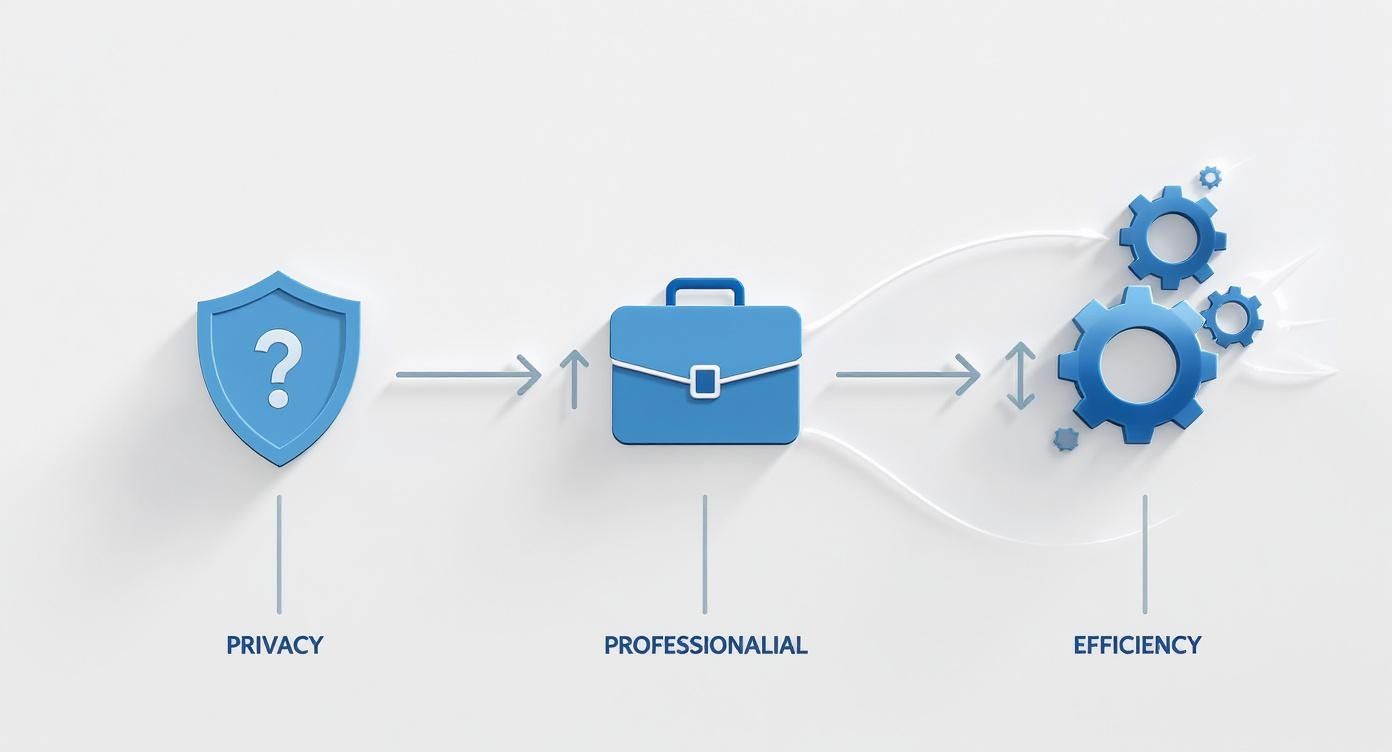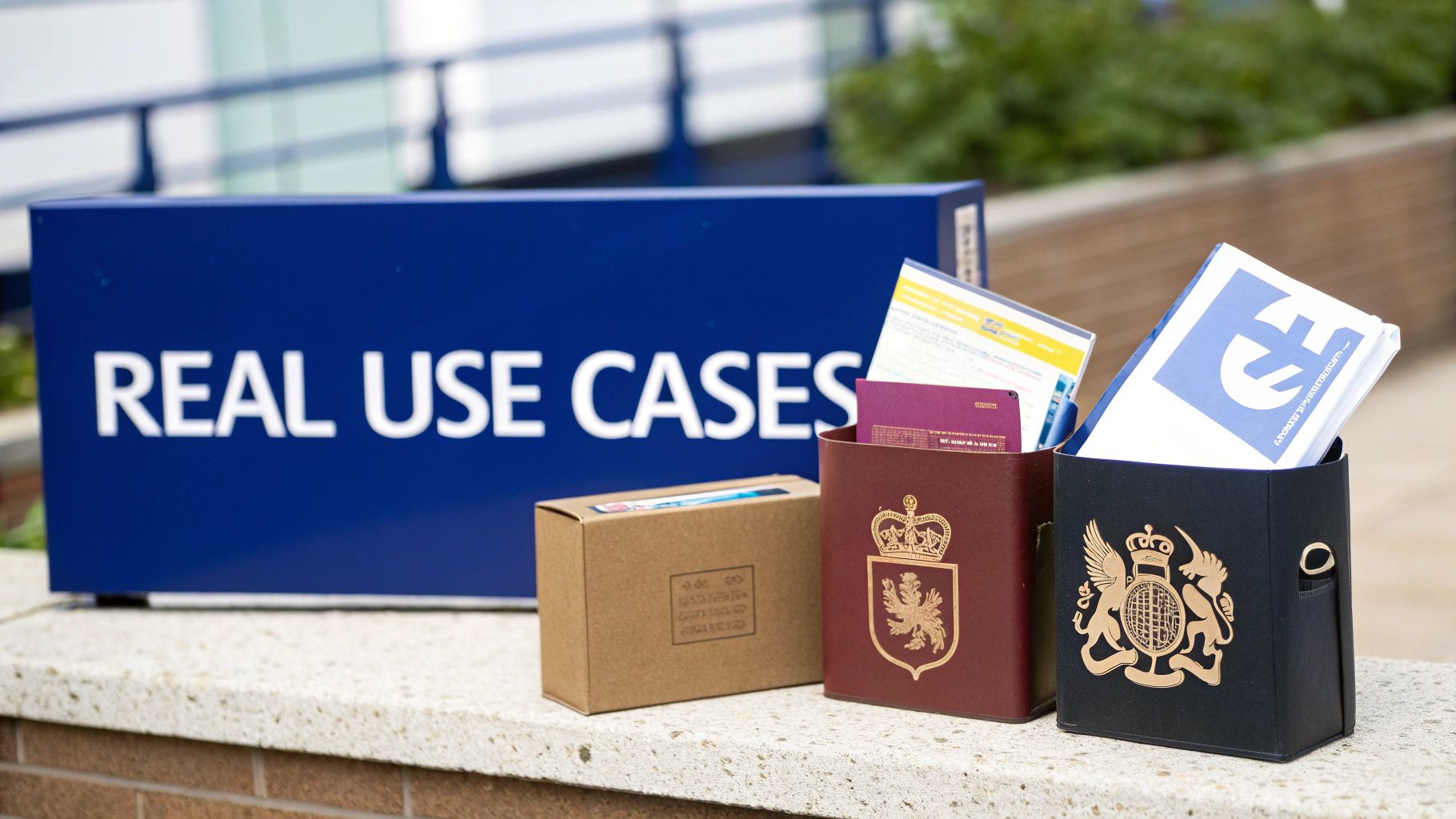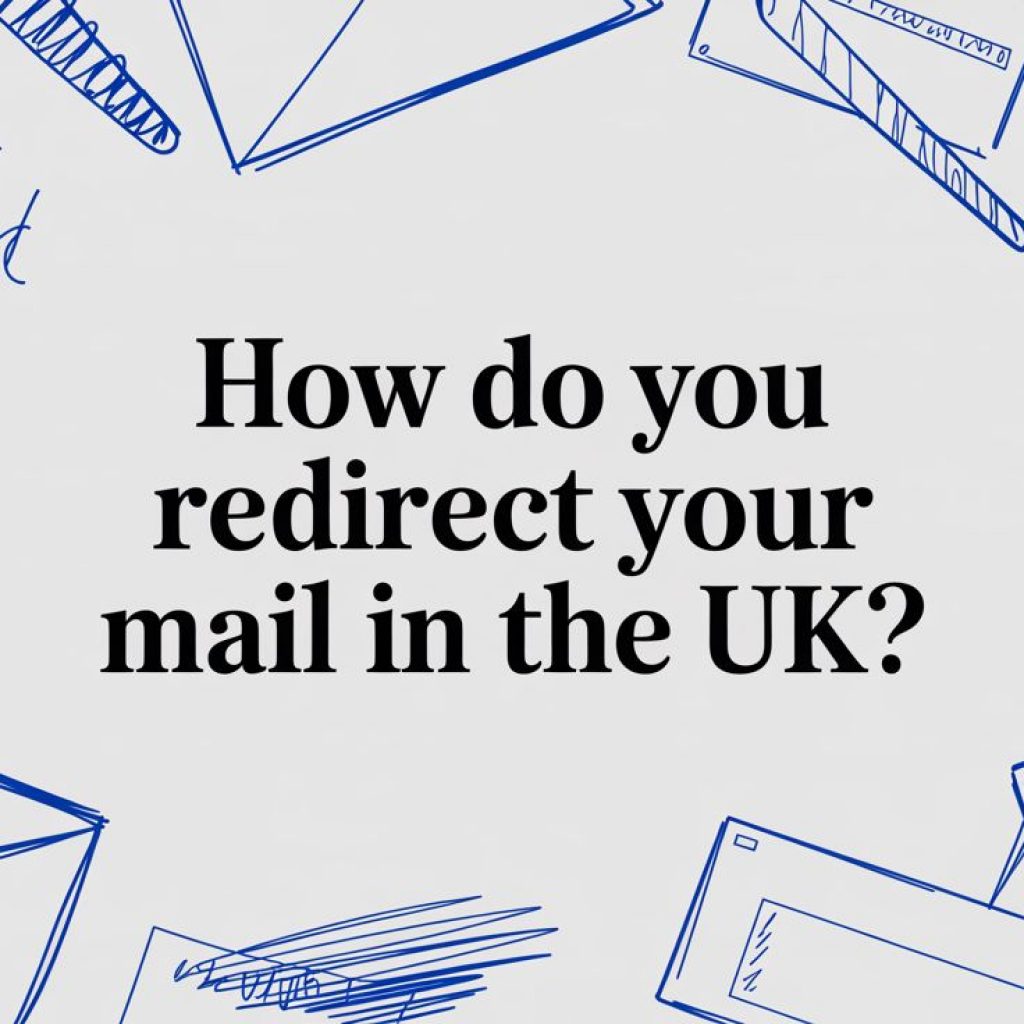Mail Forwarding For Businesses
Mail Forwarding for businesses: Privacy and a polished image – Think of mail forwarding for businesses as a smart, digital PO Box that does much more than just hold your letters. It gives your company a proper, physical street address you can use on everything, from your website to your official Companies House registration, while you get on with running your business from anywhere you like. Any post sent to this secure address is then handled exactly how you want it—opened, scanned, and emailed straight to your inbox as a PDF, or forwarded on to you wherever you are.
What Is Business Mail Forwarding and Why Does It Matter

Imagine your company’s post arriving at a dedicated business centre instead of landing on your doormat at home. A professional team signs for your parcels, sorts your letters, and instantly pings you a notification through a secure online portal. From there, you call the shots with a click. For example, a crucial contract arrives; you can have it scanned and emailed to you in minutes, allowing you to review and sign it without delay, even if you’re on the other side of the country. That’s business mail forwarding in a nutshell.
This service is the bridge connecting the old-school world of physical post with your modern, digital workspace. It neatly separates your personal life from your business operations, tackling some of the biggest headaches for today’s entrepreneurs, remote-first companies, and ambitious UK startups. It’s moved beyond being a simple convenience; it’s now a strategic tool for efficiency and growth.
Solving Modern Business Challenges
With the boom in remote working and flexible business models, dealing with mail the traditional way just doesn’t cut it anymore. Entrepreneurs working from home are rightly hesitant to put their private address on public databases, both for privacy and security. A mail forwarding service is the simple, effective answer. For instance, a freelance consultant can avoid having clients show up unannounced at their home by using a professional business address for all correspondence.
It also gives your business a far more established and credible look. Having a prestigious city-centre address on your website and business cards can seriously boost how your brand is perceived, helping you win over higher-value clients who might think twice about working with a business registered to a residential street.
At its heart, mail forwarding for businesses is about creating a professional buffer. It protects your personal privacy, enhances your corporate image, and provides the operational flexibility needed to run a business from anywhere without missing a single important document.
The Core Functions Explained
The service is designed to be incredibly straightforward. When a letter or parcel arrives for your business, you get an alert. You then log into your online dashboard and choose what to do next:
- Scan and Email: The team securely scans the letter’s contents and sends it over as a PDF, giving you instant access. This is perfect for time-sensitive tax documents from HMRC or invoices that need immediate attention.
- Forward: The original item is popped into new packaging and sent on to any address you choose, anywhere in the world. Use this for original legal documents, new business bank cards, or product samples that you need physically.
- Hold: Your post is kept safely for you until you’re ready to have it forwarded or you decide to collect it in person. This is ideal if you’re travelling and want to consolidate a month’s worth of mail into a single, cost-effective shipment.
- Shred: Any junk mail or unimportant documents are securely destroyed, keeping both your physical and digital life clutter-free. This ensures sensitive but unnecessary documents are disposed of correctly.
This level of control transforms managing your post from a daily chore into a slick, efficient process. For many UK businesses, this service is also tied directly to their legal duties. You can see how this all connects with your official company details by reading our guide on the registered address of a business. It’s a vital step for any limited company director wanting to keep their home address off the public record while staying fully compliant. Simply put, it’s a smart solution for a modern problem.
The Real Benefits of a Professional Mail Service
Going beyond just redirecting your letters, a professional mail service delivers real-world value that can completely change how your business runs and, just as importantly, how potential clients see it. Think of it less as a logistical tweak and more as a strategic move—one that builds credibility, protects your personal life, and gives you operational agility from day one.
The most immediate payoff is the instant upgrade to your professional image. An impressive business address on your website, invoices, and business cards fundamentally shifts client perception. It projects stability, success, and trustworthiness before you’ve even had a conversation.
This is what separates a serious enterprise from a side hustle. A prestigious central London or Manchester address can open doors to corporate clients and bigger opportunities that a home address simply can’t.
Enhancing Privacy and Personal Security
For any modern entrepreneur, drawing a clear line between your home and business life is essential. Using your home address for business blasts your private location across public records, making you a potential target for everything from unsolicited sales visits to data miners and even fraud.
A mail forwarding address acts as a protective shield. Your home stays your private sanctuary, completely separate from your business dealings. This is especially vital for directors of limited companies, who are required to list an address on the public record at Companies House.
By funneling all business correspondence through a secure, third-party location, you reclaim your privacy. This simple step is one of the most effective ways to safeguard your personal security and maintain a healthy work-life boundary.
For e-commerce businesses, the benefit is twofold. You can confidently list a return address for customers without ever revealing where you live, protecting both your family and your property. It also helps you manage returns more efficiently, as all packages are consolidated at a single professional location. To learn more, explore the full benefits of mailbox rental for your business.
Boosting Operational Efficiency and Flexibility
Let’s be honest—managing physical mail can be a surprisingly big drain on your time. Sorting through junk, organising important documents, and queuing at the post office are all tasks that pull you away from what really matters: growing your business.
A mail forwarding service takes this entire process off your hands. With digital scanning, you can read important letters within minutes of their arrival, no matter where you are in the world. This boosts efficiency, leading to faster decisions, quicker replies to clients, and never missing a critical deadline from HMRC or Companies House. As online retail continues to boom, the UK’s postal and courier industry has seen massive growth, driven by the need for businesses to handle physical mail more effectively as they expand.
This freedom creates true business flexibility. Whether you’re a digital nomad traveling the globe, a startup testing different markets, or a company shifting to a a fully remote model, your mail management stays consistent and reliable. For example, a business owner on holiday in Spain can receive, review, and act upon a legal notice from their UK address on the same day it arrives. The service grows with you, effortlessly handling more mail as your business expands without you ever needing to change your public address or internal processes. It’s a foundational piece for any truly agile, location-independent company.
How Your Mail Is Handled Step by Step
So, what actually happens to your post once you’ve signed up? It’s a fair question. The whole point of a mail forwarding service is to turn the clunky, physical process of receiving letters into a smooth, digital workflow. It’s surprisingly simple but incredibly effective.
Let’s walk through the entire journey, from a letter arriving at your new address to you deciding what to do with it. You’ll see just how much control you have.
The Initial Setup and Verification
First things first: you choose your plan and your new professional address. After you sign up, there’s a quick but essential identity verification step. This isn’t just bureaucratic box-ticking; it’s a legal requirement in the UK under Anti-Money Laundering (AML) regulations to stop the address from being used for illicit purposes.
You’ll typically need to provide:
- Proof of ID: A clear photo or scan of your passport or driving licence. Signing up to Acorn Business Solutions professional virtual mailing address means we may be able to verify your identity online.
- Proof of Address: A recent utility bill or bank statement showing your personal address. Signing up to Acorn Business Solutions professional virtual mailing address means we may be able to verify your address online.
This one-off check keeps the service legitimate and protects everyone who uses it. Once you’re verified, your new business address is live! You can start using it straight away on your website, invoices, and with official bodies like Companies House and HMRC.
This simple process is the foundation for enhancing your business, focusing on privacy, professionalism, and pure efficiency.

As the graphic shows, this is about more than just post. It’s a smart business tool that shields your personal details, boosts your company’s image, and makes you far more productive.
Receiving and Notifying You of New Mail
The moment a letter or parcel for your business arrives at the secure mail facility, it’s logged into the system. The front of the envelope is scanned, and this image pops up on your private online dashboard.
At the exact same time, you get an email notification telling you something new has arrived. This means you know about your post in near real-time, whether you’re at your desk or on a train. No more waiting anxiously for a weekly bundle to arrive or wondering if that critical invoice has landed.
This digital-first approach transforms your post from a passive chore into an active management task. You are always in control, with a clear, up-to-the-minute view of everything your business receives.
Taking Action Through Your Online Portal
Okay, so you’ve got the notification and can see the envelope on your dashboard. Now what? You’re in the driver’s seat. For every single item, you decide what happens next by clicking one of a few simple commands. Think of it as a remote control for your physical post.
Most providers offer a core set of actions, giving you total flexibility. Here’s a quick look at what that means in practice.
Your Mail Management Options at a Glance
This table breaks down the common actions you can request for each piece of mail you receive through your service’s online portal.
| Action | What It Does | Ideal for |
|---|---|---|
| Scan | The mail is securely opened, and its contents are scanned into a high-quality PDF, which is then uploaded to your account. | Urgent documents like client contracts, invoices, or time-sensitive letters from HMRC that you need to read immediately. |
| Forward | The original, unopened item is repackaged and posted to any physical address you specify, anywhere in the world. | Original copies of official documents, bank cards, or small parcels that you need to have in your physical possession. |
| Hold | The mail is kept safely in a secure storage area until you decide on another action or wish to collect it in person. | Non-urgent items or when you want to bundle several pieces of mail together to be forwarded in a single, cost-effective shipment. |
| Shred | The mail is securely and confidentially destroyed, helping you eliminate junk mail and keep your account clutter-free. | Unsolicited marketing materials, old statements, or any correspondence that you have read digitally and no longer need. |
Ultimately, this level of control shows that mail forwarding for businesses isn’t just a simple redirection service—it’s a complete mail management system built for how we work today. A freelance consultant can instantly scan a new contract, while an e-commerce owner can have a supplier’s sample parcel forwarded straight to their home workshop, all from the same dashboard.
Who Is Mail Forwarding For? Real-World Examples
Mail forwarding isn’t just a niche service for a select few; it’s a practical tool that solves real problems for a huge range of modern businesses. Its value really clicks when you see it in action. By looking at a few everyday scenarios, you can see how different business models use it to protect their privacy, build credibility, and just operate more smoothly.
Each of these examples shines a light on a unique problem and shows how a professional mail handling service is the perfect solution. From solo entrepreneurs to international companies, the applications are as varied as they are vital.

The E-commerce Retailer
Meet Sarah. She runs a successful online boutique from her home in Manchester. Her business is growing fast, but so is her unease about using her home address for customer returns. Listing it publicly not only feels unsafe but also looks unprofessional, which she knows could stop potential customers from trusting her brand.
Sarah signs up for a mail forwarding service with a commercial address. Instantly, she has a dedicated, professional return address to put on her website and packaging. Here’s what changes:
- Her Privacy is Protected: Her home address is no longer public knowledge, keeping her family and property secure.
- Returns are Streamlined: All returned parcels are received and signed for at one secure location. She gets a notification for each one and can have them forwarded in a single weekly batch, saving her a ton of time and hassle.
- Credibility Gets a Boost: A proper business address makes her operation look more established and trustworthy to customers, encouraging more sales.
For Sarah, it’s a low-cost solution that solves a major operational and security headache, freeing her up to focus on growing her brand.
The Limited Company Director
Next up is Tom, the director of a brand-new UK Limited Company. During the company formation process, he learned he must provide both a Registered Office Address and a Director’s Service Address. Both of these go on the public record at Companies House, and using his home address was a complete non-starter.
He chooses a mail forwarding package that covers both official addresses, instantly creating a clear separation between his personal life and his legal business obligations.
All official government mail from HMRC and Companies House is sent to his secure business address. He’s notified immediately, and the contents are scanned straight to his inbox, ensuring he never misses a critical deadline or legal notice.
This isn’t just about privacy; it’s about compliance and peace of mind. Tom can run his company with confidence, knowing his legal post is handled professionally while his home address stays completely private.
The International Founder
Now consider Maria, an entrepreneur based in Spain who wants to break into the UK market. To attract British clients and partners, she needs a credible UK footprint without the eye-watering expense of renting a physical office. Using her Spanish address would immediately undermine her credibility.
Maria uses a UK mail forwarding service to secure a prestigious London business address. This becomes the contact address on her website, marketing materials, and business cards. When potential clients send contracts or enquiries, they arrive at her London address, are scanned, and land in her email inbox in Spain the very same day.
This gives her an instant, professional UK presence, allowing her to compete on a level playing field with local businesses. It’s a smart, cost-effective way to test and grow in a new international market.
Of course, while physical mail remains critical, businesses operate across multiple channels. The average UK business user handles over 100 emails daily, many of which are crucial transactional messages. By integrating both physical and digital strategies, businesses like Maria’s ensure no communication ever falls through the cracks. You can see more on this by checking out these UK email statistics.
The Digital Nomad Consultant
Finally, let’s look at Ben, a freelance marketing consultant who travels the world while working for clients back in the UK. He has no fixed base, making it impossible to reliably receive important documents like new contracts, bank cards, or official letters. He needs a stable, reliable address that works no matter where he is.
Ben’s mail forwarding service is his anchor. It gives him a consistent UK business address he can count on. When a new bank card arrives, it’s held securely until he can arrange for it to be forwarded to his next destination. When a client sends a signed contract, it’s scanned and in his inbox within hours, regardless of his time zone.
This service gives him complete location independence without sacrificing an ounce of professionalism or reliability. He can run a global business from a laptop, knowing his crucial physical mail is always secure and accessible.
How to Choose the Right UK Mail Forwarding Provider
Picking the right partner for your mail forwarding for businesses is more than just a box-ticking exercise. It’s a decision that directly affects your company’s image, security, and how smoothly your day-to-day operations run. With plenty of UK providers out there, knowing what separates the great from the good is vital. This guide will walk you through how to weigh up your options and choose a service that genuinely supports your business.
The key is to think beyond the simple act of forwarding post. A top-tier provider becomes an extension of your own team, giving you reliability and complete peace of mind. Let’s break down the essential factors you need to look at.
Evaluate the Address Location and Prestige
The address you use becomes a core part of your brand. It’s what clients see on your website, invoices, and business cards, so the physical location and the image it projects are incredibly important.
Ask yourself: does this address reflect the kind of business I want to be? A central London address, for instance, might be perfect for a fintech startup aiming for corporate clients, while a Manchester address could be a better fit for a growing creative agency.
Consider these points:
- Credibility: Pull up the address on Google Maps. Does it look like a professional commercial building, or is it clearly a residential house or a generic mail shop on a high street? A good provider will have an address in a recognised business district.
- Accessibility: If you ever need to collect post in person or use their meeting rooms, is the location actually convenient for you to get to?
- Reputation: Do a quick search of the address. Is it associated with other reputable businesses, or is it linked to hundreds of low-quality or dissolved companies? The answer can be very telling.
Scrutinise Service Features and Flexibility
Not all mail forwarding plans are built the same. Your unique business needs will dictate which features are essential and which are just nice-to-haves. It pays to look closely at what each plan actually includes to make sure it aligns with how you work.
An e-commerce business, for example, will need robust parcel handling, including the ability to receive and sign for packages from all sorts of couriers. A consultant, on the other hand, might value same-day digital scanning of important contracts above all else. Digging into these details is vital, and you can learn more about the different types of business post redirection.
The ideal provider offers a flexible service that can adapt as your business grows. Look for clear, tiered plans that allow you to upgrade features, such as adding more mail recipients or increasing your mail storage, without unnecessary hassle.
Analyse the Pricing Structure for Hidden Costs
A low headline price can be very tempting, but it often hides extra fees that can quickly pile up. A transparent, straightforward pricing structure is the hallmark of a provider you can trust. Make sure you check for any additional charges that might not be immediately obvious.
Here are some common hidden costs to watch out for:
- Handling Fees: Are there extra charges per item received? What about for handling parcels over a certain size or weight?
- Scanning Costs: Is there a limit on free scans each month, with extra pages costing more?
- Postage Deposits: Do you need to keep a postage deposit topped up, and how does that process work?
- Storage Fees: Will you be charged if your post is held for more than a few weeks?
Always take the time to read the terms and conditions carefully to understand the full cost. A slightly more expensive plan with all-inclusive pricing is often much better value than a cheaper one loaded with sneaky extra fees.
Acorn Business Solutions Mail Forwarding and Mailbox Rental services come with clear and opening pricing with no admin or setup fees and no hidden costs.
Verify Security and Compliance Measures
Your business mail is full of sensitive information – from bank statements and client contracts to official government notices from HMRC or Companies House. Because of this, the security and compliance protocols of your chosen provider are completely non-negotiable.
First, check that the provider is registered with HMRC as a Company Service Provider and complies with Anti-Money Laundering (AML) regulations. This isn’t just good practice; it’s a legal requirement in the UK and a clear sign of a legitimate operation. Beyond that, ask about their data security. How is your scanned mail stored and protected online? Is their client portal secure and properly encrypted?
Think of your mail handler as a custodian of your company’s confidential data. Choosing a provider that takes this responsibility seriously is absolutely essential for protecting your business and staying compliant. By carefully weighing these factors—address prestige, service features, transparent pricing, and robust security—you can confidently pick a provider that will be a true asset to your business.
Answering Your Questions About Business Mail Forwarding
Making the switch to a mail forwarding service is a big step. After all, you’re trusting someone else with your company’s important post, so having a few questions is completely normal. To help you get comfortable and make a confident decision, we’ve put together some straightforward answers to the most common queries we hear from business owners in the UK.
Think of this as your final checklist before getting started. We’ll cover the practical, legal, and operational details so you know exactly what to expect.
Is Using Mail Forwarding Legal for a Registered UK Company?
Yes, absolutely. Using a mail forwarding service is not only perfectly legal but also a very common practice for businesses across the UK. The critical part is choosing a provider that is fully compliant with UK regulations, particularly the Anti-Money Laundering (AML) rules.
Any reputable service will be registered with HMRC as a Company Service Provider. This isn’t just a box-ticking exercise; it ensures the address you’re given is legitimate and can be officially used as your Registered Office Address with Companies House and for all your correspondence with HMRC. It’s a robust, legal solution that lets you meet your statutory duties while keeping your home address private.
What Is the Difference Between Mail Forwarding and a Virtual Office?
That’s a great question, and it’s easy to see why the two get confused, as they often overlap. The simplest way to think about it is that mail forwarding is a specialised service, while a virtual office is a broader package.
- Mail Forwarding is all about one thing: receiving, managing, and sending on your physical post and parcels. If your main goal is to get a professional address and a slick system for handling your mail, this is exactly what you need.
- A Virtual Office bundles mail forwarding with other services. It typically throws in things like a dedicated business phone number, call answering, and sometimes access to meeting rooms.
So, if you only need your post handled, a dedicated mail forwarding service is the most direct and cost-effective choice. If you’re looking for a wider suite of remote business tools, then a virtual office is probably a better fit.
Choosing between them really just comes down to what you need right now. Both give you that all-important professional address, but a virtual office adds communication tools, while mail forwarding focuses on perfecting the art of mail management.
Even in our digital-first world, physical mail still has real impact. Think about it – direct mail often gets more focused attention than a fleeting digital ad. A huge percentage of mail received in UK homes is kept for weeks, which is fantastic for brand recall. A well-timed letter can cut through the online noise and leave a lasting impression, which is why professional handling of your incoming post is still so vital. You can find more insights on the surprising power of direct mail at modernpostcard.com.
How Are Larger Parcels and Signed-For Deliveries Handled?
Most professional mail forwarding providers are set up to handle much more than just standard letters. They can easily receive and sign for parcels and recorded deliveries from all the major couriers, including Royal Mail, DPD, DHL, and others. The whole process is designed to be seamless for you.
When a package arrives, a team member signs for it on your behalf. You’ll get an instant notification in your online portal, just like you would for a letter. From there, you can decide whether you want it forwarded on to you. It’s always a good idea to quickly check a provider’s policies on parcel size, weight limits, and any extra handling fees to make sure they can cover what your business needs.
For more information on our mail handling options please see Mail Forwarding or Mailbox Rental for more information
Can I Update My Address with Companies House and HMRC Myself?
Of course. Once you’ve signed up and your mail forwarding provider has given you your new business address, you can—and should—update your official records straight away. It’s a very straightforward process that you can do online through the government gateways for both Companies House and HMRC.
You’ll just need to log into your accounts and change your Registered Office Address (and your Director’s Service Address, if that applies) to the new one. The change usually shows up on the public record within a day or two. While it’s simple enough to do yourself, many providers can offer guidance if you get stuck, making sure your company stays fully compliant without any stress.
Ready to give your business the professional image and operational freedom it deserves? Acorn Business Solutions offers secure, compliant, and flexible mail forwarding services designed for UK businesses of all sizes. Protect your privacy, streamline your mail handling, and build credibility from day one.






